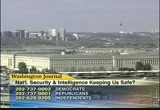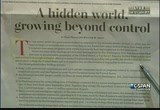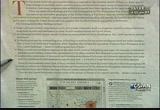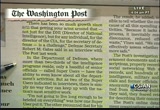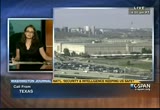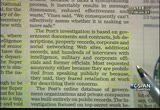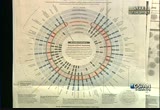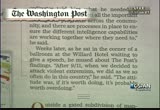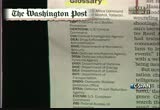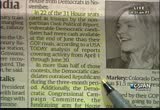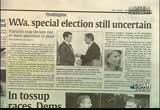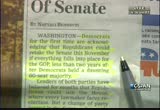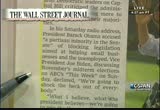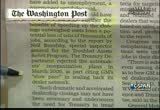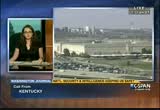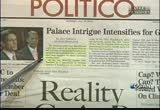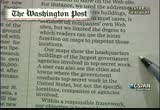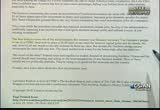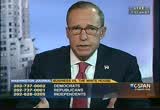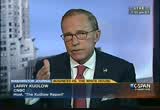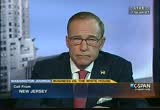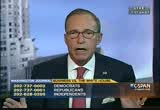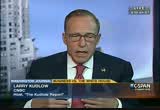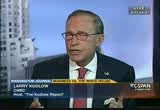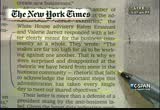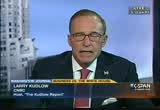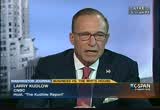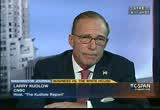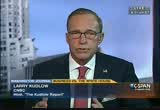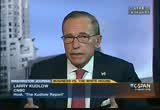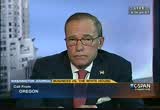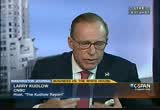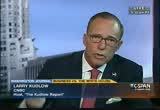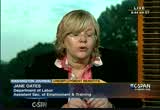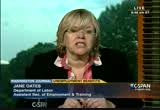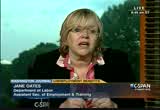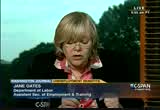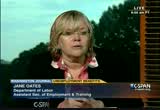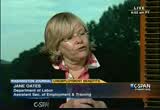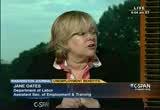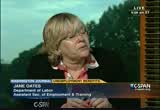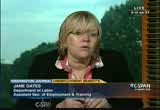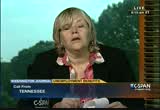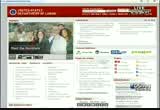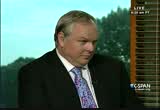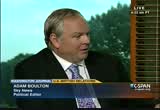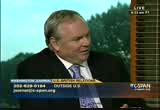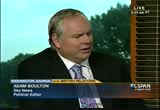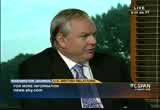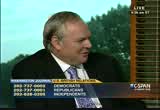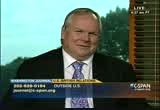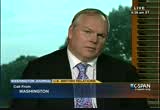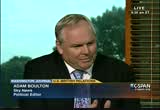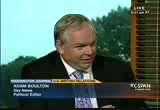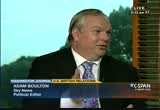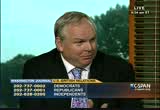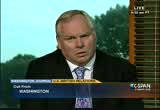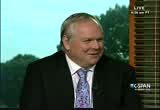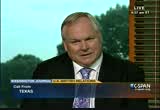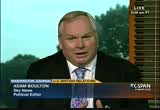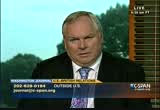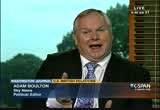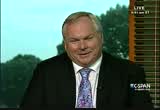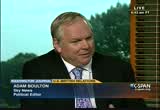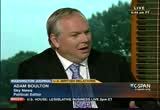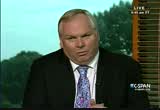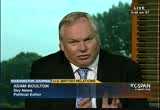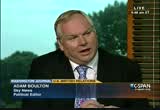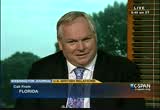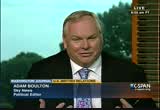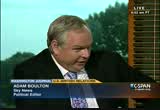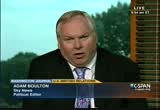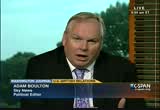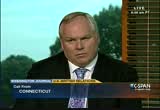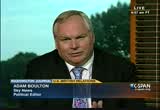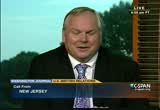tv Washington Journal CSPAN July 19, 2010 7:00am-10:00am EDT
7:00 am
7:02 am
our washington post reporter called today top-secret america hidden from public view and lacking in thorough oversight. after nine years of unprecedented oversight. 1900 private companies work on counter-terrorism. some 10,000 locations across the united states. an estimated four under and 54,000 people old top-secret
7:03 am
security clearances. 33 building complexes, top- secret, they have been built since 911, 2001, 51 federal organizations and military commands operating in 15 u.s. cities track the flow of money to end from terrorist networks. analysts that makes sense of documents foreign and domestic share their judgment by sharing intelligence reports every year. the volume is so large that many are routinely given more. michael, republican line, houston, texas, good morning.
7:04 am
7:05 am
host: "lack of focus, not lack of resources was at the heart of the fort hood shooting, as well as the christmas day bombing attempt. an alert airline passenger saw smoke coming from his seatmate. there are issues that really concern the people in charge of national security. but not just for the director of national intelligence, but any individual. defense secretary robert gates. only super users have the ability to assess defense department activities, there is no way he could keep up with the nation's sensive work. scott joins us from
7:06 am
pennsylvania, democratic line. caller: this is my first time getting through. good morning. it seems that most of the work done by the intelligence industry is not done for protection. it is done for subversion around the world. is that a fair assessment or not? host: will ask our callers. david, an independent line, texas. caller: as long as we are fighting these wars over there they will keep trying to come up with an end to us. if you think about it, the times square bomber, the fort hood shooting, the christmas bomber, it is all a result of our various military interventions. especially over the middle east.
7:07 am
as long as we are making their lives miserable over there, the national security situation says they can do it. host: "additional records, hundreds of interviews with intelligence, military, and corporate officials, most requesting anonymity, either because they are prohibited from speaking publicly for fear retaliation at work. today's article describes the government's role in this expanding enterprise. tuesday's peace describes their dependence on government contractors. on the web, an extensive
7:08 am
database built by the post about top-secret america is available. let's go to milton, florida. caller: why did bill clinton change the law in 1993 where medicare is primary payer overall insurance? george bush got blamed for medicare going broke. this year, everyone on disability, everyone on medicare host: right --
7:09 am
medicare. host: right now we are focusing on this piece from "the washington post." our question is -- is the government giving us safe? this is the breakdown of all the different agencies within the united states government that deals with various things, including he intelligence, counterintelligence, and of the post breaks it down saying that 39 agencies to intel analysis. "262 technical intelligence. 25 to counter financing. two dozen workers encounter information. 18 do psychological ops. 16 work on special ops." they point out one, "they shifted their overseas post- 9/11 focus to fighting against terrorist leaders and networks. looking at how the state department works on this issue.
7:10 am
there are other graphics, let's check back in with the article. "elisse 20% of the government organizations that exist to fend off terrorist threats were established or refashioned in the wake of 9/11. many that existed before the attacks grew to historic proportions." carbondale, illinois. democrats line. caller: i do feel safer. if it was not for 9/11, those people died in vain but if it was not for them we would not have programs that existed.
7:11 am
how quick they are to gain their background and financial information, case. they were able to get information about him so quickly. that is why we need programs like this. ... programs about keep a single. o host: "the cia director, was also interviewed by the post last week, said that he has begun mapping out a five-year plan for his agency because the levels of spending since 9/11 are not sustainable. retired admiral dennis blair said that he did not believe that there was overlap in redundancy in the intelligence
7:12 am
world. much of what appears to be redundancy is providing tailored intelligence for multiple customers, there are processes in place to make her the different intelligence capabilities are working the other where they need to. news about the post's findings. -- he mused about the post's findings, saying that the attitude seemed to be that if it was worth doing is worth overdoing. joseph, the morning. caller: they are keeping a safe.
7:13 am
vietnam, you say that it is antiquated or obsolete, you say that now is a technology issue and the human element is what makes this work. host: tennessee, kentucky hearing-impaired -- pounded ky. -- kentucky. caller: we need to be better than what we should be doing. host: ok, let's go to twitter. doug rights that of taxpayer dollars are wasted, too much, national security and intelligence of the best things to waste them on.
7:14 am
manhattan, democratic line. caller: i would like to say that everything is alright until something happens. after 9/11 it was supposed to be the end of this note piping of everything. host: looking at the shooting in fort hood, texas, last fall, en an army major attacked people there, "the washington post," writes that "information about him did not get to where it needed to go. just 25 miles up the road from walter reed, their 102nd military intelligence script that had been doing little to search for potential threats. instead the commander turned the unit attention to assessing general terrorist ability in the u.s..
7:15 am
one of six of the joint terrorism tax forces were already doing that work. secrecy was in the intelligence world and hampered protectiveness in other ways in the defense department, the problem going back to an ultra secret group of programs for which access is extremely limited and monitored by specially trained security officers. the pentagon list of code names for them runs 300 pages." minnesota, evelyn, hello. caller: i was just calling to say that i think that our government waste too much money on everything. defense, national security, so much so that i think it has all become corrupt. the people, when they talk about
7:16 am
taking back our government, one of them should be that they should stop our government from spying on us and that kind of stuff, which they legally do not have a right to do, it is unconstitutional. there for her all the money that they spend is not going to stop a terrorist attack if a terrorist really wants to get through and americans should understand that. thank you and have a day. host: edward, stockton, good morning. caller: good morning. like you said, i am calling from stockton, california. i completely disagree with the caller who felt that we should spend more and more money on fighting terrorism.
7:17 am
most of them are likely not even working, getting all sorts of state funding and u.s.. fighting a war over in afghanistan and all of that, it is all just trying to get money and take over the oil. also that we should be worried about iran and their nuclear capabilities, focusing on just protecting our borders. host: in this top secret america washington post investigation they show 67 different centers monitoring overlapping bits of intelligence to keep an eye on military government activities
7:18 am
24/7. this cluster in blue is military, at the top is intelligence, on the right is homeland security, in the bottom in think it is civil. they also clued an entire glossary of all of the different agencies, what they're called, and how to remember them. quite complex. let's go to denton, texas, william undemocratic line. caller: thank you for having me. this is a great subjects. actually question the efficacy and the intent. i know that terrorism is being used as a talking point and a selling issue for this massive expenditure, but i wonder and question, are these agencies not
7:19 am
more involved in finding out information about americans in general? a thing it has been a huge invasion of our privacy to a certain extent and i kind of believe that many of the things that they published, we have more transparency and i think that americans ed to be more aware of the information and notice their true purpose. host: ok. we're looking at this piece called "the hidden world, don't -- growing beyond control." it was a two year investigation. the team that looked into what they're looking into a top secret america hidden from public view and lacking from oversight. checking on twitter, joe writes
7:20 am
"the government is giving us safe and not free, that has failed." our next call is from baltimore, maryland. david, are you with us? caller: hello? host: welcome. i see that you are calling on the democratic line. go right ahead. do you think that national security and intelligence security are keeping us safe? caller: know. if it was about the bloated budget that we have, what about one week ago? but why would like to say to all of the chicken hawk republicans, if you would like to balance the budget, bring the military people home and save that
7:21 am
money, but the fbi and the cia do the job they did not do after 9/11. bush gave medals the people that should have been fired. someone it messes with us? we turn them into a parking lot. simple. thank you. host: looking at politics in "usa today," the reflections of an anxious electorate." "new to politics, this stay at home mom has become the director of the local tea party patriots, leaving some of the headed up to -- leading some of the had it up to hear conservatives. their favorite candidate has gone from longshot the front runner in his race against a former lieutenant governor, who is backed by the republican
7:22 am
establishment. other stories in politics, "cash advantage, a republican fund- raising is on the rise. 31 house seats, both candidates had more cash than their gop rivals covering activity from april 1 through journey -- june 30 in half of those contests. additionally, a democratic campaign committee, the fund- raising arm for the democrats, held a two line cash advantage over the national republican committee in day according to the most recent figures. looking at incumbents and potentially having the edge today, colorado and republican opponents, getting $1.5 million on hand, he has $763,000.
7:23 am
bill foster has over $1.5 million on hand. his opponent, 245,000. looking at a couple of races in north dakota and virginia, the republicans do have more cash on hand. looking at the topic, said seat left behind by robert byrd. "pending legislation to put the senate seat on the ballot in november, the west virginia legislature recessed on sunday without acting on it. officials question whether or not they can forward the election timetable of the bill was not passed by yesterday. we will be watching to see even happens." of course, tomorrow mr. goodwin will be taking over that seat.
7:24 am
cart could win will be set -- carter goodwin will be joining the senate as its youngest member at 36 years old. let's get back to this topic, national security and intelligence. are they keeping us say? stephen, an independent line. caller: can they really tell? there is no way of telling really, with respect to the color, those colors you wonder if they were randomly picking them or if something was going on. how can we know? thank you. host: college park, maryland. robert. caller: i work in the field. for those of you worrying about us listening in on you and paying attention to you, first of all we do not have the manpower to look at all 300
7:25 am
million americans. second of all, we do not care what you do with your private lives, most of us in the field know it is a boring life. we are defending the nation against people that want to kill us for religious purposes. that is all that we are doing. if we have to listen in on cell phones, then that is what we will do. host: do you see them working at cross purposes? caller: the lack of communication between those agencies, there are different groups within the intelligence community that do the same thing and look at the samenformation without talking to each other.
7:26 am
that is the biggest threat to the intelligence community. we are all patriots and americans, but we do it in a secretive world and that is something that the american people need to grow up and understand. host: we will go to frank on the democratic line in california. caller: thank you for having me. host: thank you for calling. go right ahead. caller: i wanted to say that these redundancies have to be there because the massive amount of information is use the get shared with every agency. as far as having for them and paying for them, we have to be careful as americans that they do not drift into violating her civil rights in the name of protecting us. j. edgar hoover tried to
7:27 am
subvert civil-rights leaders back in the 1950's, as well as political figures. our lawmakers have to have oversight of these agencies. host: looking at some more political stories, from "the washington journal, ' "two years after the democrats held a majority the republicans could win the house, where every lawmaker faces reelection. but a change of party control in the senate, where republicans must captured 10 seats and only one-third of the members are running seemed out of a question. now that no longer seems the case. democratic leaning states showed tight races bringing the number of seats that republicans could seize from the democrats to 11."
7:28 am
another story from "the wall street journal," "president obama chided by his own party. democratic leaders on capitol hill criticize the administration for not doing more to help them retain their majorities. president obama accused of partisan minority in the senate of blocking legislation aimed at helping small businesses and the unemployed. joe biden discussed november's midterm elections on sunday, declaring "we will shot back out of everybody." dewitt, good morning. caller: i am calling to say that with the technology that we have nowadays, my father was an engineering and mechanical designer for the government. he designed stuff for the government. i do not know how, but some of the blueprints that he brought
7:29 am
home, it is pretty scary stuff. it has not been released so i will not say what it was, but it was scary technology. before he died he was working on something -- i am not sure what -- but the blueprints i shredded and everything else. if the senate and government was worried about us, we have a lot of money hidden that they hide from us and we are not made aware of it. why not just starting -- start building silos underground if they care about our well-being? host: from "the washington post," "and watchdog group says
7:30 am
that the rush may have made problems worse, closing of dealerships may have added to unemployment and they should have considered whether the benefits of propping up the closing to outweigh the costs of the loss of tens of thousands of jobs. the treasury department rejected the automakers reorganization plans. the treasury, which has committed $80 billion to two carmakers, criticized the report, saying that without government assistance those companies face failure and liquidation." a disagreement there. another story from "the washington post." "a burst of activity to target human trafficking has hit dozens
7:31 am
of laws to go against traffickers. they focus on practices that remain largely hidden in the country. so far for the bills have been enacted in 350 introduced. washington state, vermont, and oklahoma are amongst the state's tackling this." kentucky, daniel, a republican line. hello. caller: yes, hello. caller: what do you think about the topic we are on. national security and intelligence systems, are they keeping america save it? caller: i thought about that for several years. more and more i think about national security, i think it is more than just the job of america. i would hope that it is also the
7:32 am
job of our allies, the ones we have international affairs with. i would like to see them become more involved. i think that there should be action by-yearly. congressional hearings, oversight committees to sit down and look at the budgets for spending for national security and intelligence. i know that national security and intelligence is something that we need, but i like to think outside of the box and more and more i believe that the american public itself should become more involved in what we consider national security and intelligence for this country. i see our country being left alone. i do not see many of our allies getting more involved. as much as i would hope this yet. i think it is all of our responsibilities.
7:33 am
especially in the time since 9/11, i think that spending for national security and intelligence warrants what is very appropriate for the times we have been living in, the things we have been going through with our troops being, in many different countries, like afghanistan, iraq, iran, more and more i believe that national security and intelligence should become much more involved with by the american people itself. host: ricky, democratic line. caller: i think that the question of the day mrs. the real issue. i think that the real issue -- misses the real issue.
7:34 am
i think that the real issue is that they are a cross purposes. these agencies are tasked to do different things and what we are not asking would be a great question for a panel of guests to flesh out and put some meat on the bones of this cross purposes. no caller this morning has addressed your statement that flies by. cross purposes. thank you. host: next, oakland, california. caller: in a first-time caller. host: thank you for calling. caller: i have a question concerning the military individuals coming home and committing suicide.
7:35 am
where is the security and intelligence regarding them? it feels like we are missing something here when we have young people coming home, even over there, killing themselves. where is the intelligence there? that is my question. caller: -- host: taking some looks at political stories, republicans could set off a frenzy of behind-the-scenes jockeying, there is new tension. "palace intrigues intensifies for gop. john boehner is a slam dunk to become speaker if they take over the house, but eric cantor seems to be positioning himself to run the party if they fall short in november. sources close to him flatly declared that he would not run against john boehner are under any circumstances.
7:36 am
looking at jay rockefeller in the absence of robert byrd, after a quarter century on capitol hill, he is finally the senior senator from west virginia and the leader of the state's delegation. but for him is just another day of the office. we will take a brief look at where things are at with the bp blowout in the gulf of mexico. "usa today" reports on the efforts engaged in the cleanup. "interviews with cajuns' along the coast show that their ability to persevere in a hostile environment, they refuse to be expelled by a 21st century
7:37 am
menace spreading economic hardship." let's go to belvedere, ill., where richard joins us on the democratic line. caller: that part about feeling safe? i feel safe right now, they do a great job of getting everything done, and i think that the main focus should be the job. the country is so short on jobs , maybe there is duplicity but that is ok and we need to be safe. if it takes a couple of more people, that is fine. many people do not even have jobs. maybe when they do the research in december when they talk about lowering the deficit, may be each department to do research on their own apartment to figure
7:38 am
out who has extra jobs. mainly the whole thing is if everyone is working that is good. host: "when the man boarded the plane bound for detroit, trying to blow up, no one put the signs together, as officials would testify, the system had gotten so big that the lines of responsibility had become hopelessly blurred. there were so many people involved, everyone had got to connect. but i had made it clear, exactly, who had primary responsibility, he allegedly tried to ignite explosives.
7:39 am
buffalo, n.y., republican line. michael, what do you think? are these intelligence agencies keeping us safe? caller: i believe that what they should do is look at other things. every little detail. anyone could be a terrorist. you have to look at every look and cranny. a button could be an explosive or something. the security has to be good in one way and bad in other ways. if it smells like a bad guy, you can catch the bad guy. there are no rules on all of
7:40 am
this. host: let's look at how this was dealt with. "mr. blair's solution was to create another team to run down every important lead, telling congress that he needed more money and analysts to prevent a mistake. more is often the summit -- the solution of leaders of the enterprise. the department of homeland security ask for more equipment, although it cannot find enough qualified people to fill its intelligence unit right now." florida, diana, independent line. caller: good morning. i do not think that we are safer and all. these agencies have gotten so big that they are not communicating. it has invaded our civil-rights. the gulf catastrophe is essentially a matter of national security.
7:41 am
the only things those officers are doing is keeping the media away. as anderson cooper stated, our civil rights have been suspended by security agencies, preventing people from getting close to this issue. that is where i stand. host: maine, democratic line, royal. hello. caller: how are you? host: fine, thank you. are these agencies keeping us save? caller: it is difficult for us to know, but the question of redundancy is something that we need to think about. probably is necessary, for especially in this area. mechanical and electrical systems, if they did not have them, these airplanes would fallout of the sky. we have redundancy in automobile
7:42 am
companies, which is probably a good thing. redundancy actually has a lot to do with safety in a number of areas, it probably does in this as well. it is very difficult to say what the next plan will be five people that have decided that philosophically we are the enemy. caller: john, wrote -- host: john, republican, houston, texas. caller: i wanted to comment that i think national security agencies are protecting the country. i think that the washington post is doing the work for the enemy. i just looked at the web site, top secret america. it has all the databases put together that they posted on the internet. now people can sit in caves in afghanistan and plan out there next step. these of the same people that
7:43 am
expressed outrage that valerie plane was pouted. host: let's look into that issue. the editors of "the washington post" right "be made public safety judgments about how much information to show on the web site. addresses, for instance, but we limited the degree to which readers to use the function of the map. the headquarters building for the largest government agencies, users can see cities and towns where the government conducts a top-secret work, but not this of locations, companies, or agencies involved. within the granuloma understanding of the top super world we are describing. " c. j., good morning.
7:44 am
caller: this morning i was listening to your program. one thing i thought of, we could solve three problems with one simple answer. one of them is border defense. the other one is unemployment. the third would be the deficit. we could create 60,000 jobs immediately by hiring at about $16,000 per job, hiring unemployed people now to put in the border defense program. directly taking the money they would have spent for unemployment insurance, so it does not add to the deficit, taking 60,000 people and putting them on a payroll, even if it
7:45 am
is the payroll of a government they will pay taxes. it will also be up our reserves on unemployment. host: we are talking about this series that will run throughout the week called "top-secret america." you can find it on the website of "the washington post." , and next, larry kudlow -- coming up next, larry kudlow. we spoke to the host of the program about how the oil spill is affecting the area, contracts and claims, and how the moratorium on offshore drilling could affect their economy. >> this is the rage that we live on, the levee system. here on both sides, water.
7:46 am
if not for the levee system, we would be washed away. >> these people that live here? >> no. you have -- i would say that it is probably 70% oil field, 30% fisherman. maybe even higher in terms of oil field numbers. the fishing industry is a dying industry right now. shrimping. >> [unintelligible] what has the moratorium done? >> bring it to a halt. people are still drilling, still
7:47 am
operating. but if the drilling a shutdown -- is shut down, they'll looking at a 40% drop in tax collections. our biggest taxpayers are directly related to drilling. nine out of the biggest ones are located where the oil will go down. they have invested a lot of money in a training facility and are now looking at revamping the operational side. the rest are being shipped throughout the world. there will be tremendous moratoriums.
7:48 am
>> "washington journal" continues. host: larry kudlow is the host of a cnbc prime time show, thank you for joining us. guest: thank you for having me. host: you recently wrote that the clash between business and administration has become a high drama news story of the summer. tell us more. host: -- guest: there is a bad aspect to the economic problem. you see these business roundtable and others that are really in a blood war with the white house over taxes, regulation, spending, trade, they're all very outspoken about it. the ceo of verizon started this
7:49 am
about one month ago. people that pick up on that are asking for business investment tax relief. they would like to have much greater certainty about a rash of regulations coming out of health care, financial bank regulations and other areas. many economists believe that a business investment would be the best job-gainer. we have a very iffy economic recovery. my own point of view on this is that the white house should listen to what businesses are saying. we have the highest corporate tax rate of the large countries around the world, we should from more -- promote more business investment. president obama has done this with the smallest companies, why not make it universal for all american businesses? the war between the white house
7:50 am
and big business is not a good thing for the economy. host: what are some of the key criticisms you have about the direction the president is taking? guest: the fears of higher taxes are difficult. it affects the cost of investment in new projects. for my money, you want to create jobs, you need help the businesses and capital to finance them. why would we raise those tax rates on capital or any form of investment? with taxes rising in the obama care health care program, that is one key point. i note that businessmen i have interviewed on our show, they are concerned that these significant budget deficits and a large volume of over-spending,
7:51 am
it sets up a strong possibility that tax rates are going to rise in the future, even more than people are talking about right now, which is a deterrent to investment. this massive confusion about the cost and implementation of these regulations, we just had a bank regulations bill passed the senate last thursday asking of corporate end user is using the market to hedge derivative positions for crops and agriculture, interest rates or currency, things of that sort, airlines hedging jet fuel, will they be able to do it? how expensive will be? in general there are a lot of factors working against the normal function of business. you want to clear up that uncertainty. there is a lot cash out there, as much as $2 trillion by some estimates, sitting on corporate balance sheets.
7:52 am
the trick is to put it to work. right now there seems to be a fear, a worry on the part of business that the future is so uncertain. without this new capital we will might get a healthy recovery. host: you write "the best thing to come out of the administration this summer was timothy geithner's pledge to me to place a limit on tax rates for investor capital gains and dividends. no one wants to see an increase in these tax rates, but at least these pledges mean that the tax rates will stay low." what is the implication of that? guest: if secretary timothy geithner and have his way, the bush tax cuts expire at the end of this year. those are across the board. personal tax rates for all income levels, plus capital gains, dividends, and the estate tax. what he told me in an interview
7:53 am
that i had with him about 10 days ago, his preference and the preference of the white house is to take the dividend's tax, which is scheduled to expire at 15%, not to let it go to 40%. he would like to cap that at 20%. the capital gains tax is scheduled to go to 20%. he would like to put a cap on that. the health care bill will raise that more in a couple of years, but that aside. i thought that timothy geithner was the least instructive. i would rather not raise those tax rates at all. but at least there is certainty that those key investment tax rates will stay historic low. i gave him high marks for that. the trouble is, that is just one piece of the pie. a lot of people in business are worried that we will not get certainty regarding a myriad of other issues. i think that timothy geithner
7:54 am
was instructive, for a few days the stock market responded positively. those investors and firms, you want to know that your after-tax investment return is going to be high and up to justify whatever cost or expense it takes to start a new project that might hire jobs. what we need to do here, i think, clear up these confusions and uncertainties. no. 2, to tell you the truth, business is taxed too much. i would like to see that change. i would like to see full-fledged tax reform, get rid of the loopholes for large firms and small firms. you would see a much better jobs recovery if we help business, not government. host: doug, good morning. welcome.
7:55 am
caller: having the capital gains tax lower than income distorts the economy. the difference in taxation will move money away from wages and into profits, artificially expanding the financial sector, making a bubble more likely. capital gains and regular encompass more likely contributing factors in the great depression and the recent recession. we should gradually moved to taxing capital gains the same as regular incumbent, letting the free markets work. guest: i have some sympathy with that view. what the caller is saying is interesting. i do not agree that the capital gains tax caused the financial meltdown. far from it.
7:56 am
but i will say this. i do not know why we tax savings and investment. the $1 of income that you are on the job should cover all of that. why tax it a second time as capital gains when you sell an asset you might have purchased with the end come? why tax, for example, the so- called death tax or inheritance tax? it has already been taxed several times. why not simplify the system, get rid of the credits, deductions, and exemptions, make it so that you can put it on a page or two, keep those tax rates in line, do not tax savings at all. why should we tax capital gains and dividends? we have taxed at once, do not do it. we should not tax capital. we should try to tax consumption
7:57 am
as much as possible with a neutral tax system. i do not agree with the caller 100%, but he makes some good points. host: ocean city, good morning. caller: it was reported on your channel about seven minutes ago that there was a mistake from the treasury department in terms of closing the chrysler and general motors dealerships, that it will cause more job losses. there is a tug of war between the government and that particular study. i was wondering what your view was on that. host: looked -- guest: look, regarding the mistake, that is a generic criticism of the government's takeover of general motors and chrysler. although i am not an expert on every detail, basically, given the shrinking volume of sales and a shrinking market share of those big car companies, the
7:58 am
government deal when they took them over was to abolish a bunch of the dealership, which caused massive layoffs of course. look, i oppose those bailouts. my view is that if a company is failing, be it a car company, a bank or insurance company, you go into chapter 11 or whatever your bankruptcy procedure is, you sell the assets, restructure and invested. regarding general motors and chrysler, any way that you slice that, they were going to lose staff and dealerships. they had lost so much market share in the car business. foreign car companies operating in the united states, be at honda, toyota, bmw, mercedes- benz, we have not done a very good job. perhaps they could be restructured now.
7:59 am
there was no way around the fact that they were going to lose jobs. if that is what this debate is about, i guess it is a certain inevitability. i wish that the government had not taken them over. host: let's take a look at comments made last week by christina roemer. she is talking before the joint economic commission. guest: in our report we estimate the impact in two ways. the first is a model-based approach. this approach uses multiplier estimates based on historical records to estimate how the recovery act likely translate into employment. the second approach that we used to estimate the act depends not on policy multipliers estimated from past history, instead uses statistical procedures to project the likely path of employment based on information available until the end of the
8:00 am
first quarter of 2009. comparing the actual path of the employment of a forecasted baseline. this approach indicates that the recovery act as raised employment relative to what it would have been by 2.5 million jobs as the second quarter of this year. of the jobs saved or created, 800,000 are due to the public investment outlays that have occurred so far. . have occurred so far. the projectio approh yields a subsub stancely larger number t suggested employment as of the suggest quarter is 3.6 million
8:01 am
stimulus was put in in the early 2009. we were told the unemployment rate was going to fall to 7% if it was instituted, and instead it is 9.5%. these models they are talking about -- you know what i would like to see? i would like to say a model, how many jobs have been destroyed by the stimulus package? how many jobs, for example, went by the wayside because the private economy was not able to raise either sufficient to capital or had enough freedom to create the new jobs from a new business investment. in other words, all of these actions have consequences. when you borrow trillions, you
8:02 am
are pulling money out of the private economy. that is money business could put to work. when you raise the minimum wage two or three times, you are raising the relative cost of hiring the younger teenager or the 25 year old who may not have all the skills and experience. i mean, these attempts to model the, like that are very misleading. they have almost no credibility. i feel sorry that she has to run through these. this is a political operation. it has nothing to do with fundamental economic analysis. host: i want to share with our viewers and listeners in "the financial times," today, larry summers -- america's stance on the -- recovery, is the only sensible course.
8:03 am
can you react to that? >> you know my thought -- guest: did know, libby, my thought is this. this week the senate will take up the extension of the unemployment benefits. and it will run them up to 99 weeks, call it two years. i am not thrilled about that because i think at some point, like europe, you start creating incentives to stay unemployed. but you know what? i would pass the darned thing, i would vote for the unemployment package just on humanitarian grounds. but here is what i would add to it -- jobs to work, economic growth to work, by listening to what business is asking the white house. mr. sommers does not refer to that. lower the corporate tax rate and accelerate or go to full cash expensing for the right off of new business investment. if you ram those two policies, you would be helping the unemployed safety net and you
8:04 am
will be putting pro-growth tore into the u.s. business sector which right now is in the middle of a capital strike and is afraid to put its own resources to work. i don't think you can spend your way out of this recession. i think the economy is very sluggish. this recovery is so subpar and the jobs aspect is so disappointed -- disappointing and stock market investors are very pots -- pessimistic. i am an optimist the kind of guy but i would like to see chefs in these policies and that it larry summers and the rest can do a much better job. host: minnesota, independent line. caller: i agree that we really do have to change the loopholes but how will we do that when congress is bought up by all of the corporations? they have secret accounts for fake companies in the cayman islands paying no taxes whatsoever. i am curious how do you expect
8:05 am
us out in the hinterland here to, you know, trust anybody in congress at the present time when they are bought out by these corporations? thanks, larry. j., thank you for calling. look, i agree, this is a monumental task. down through the years -- look, i saw it in the 1980's. in the middle 1980's, there was a good tax reform bill that got rid of tons of loopholes, reduced thousands of pages of tax regulations and left -- this was the reagan tax bill, and rostenkowski -- two rates, 28% and fifteens%, the closest to the flat tax we have gotten and i wish we could go back. i think the caller is right, it is a monumental political task. but if you sat people roundtable and you said, look, we've got to change this code to make it as efficient and pro-growth as possible, we have to restore
8:06 am
incentives at the market -- margin whenever we can. we've got to make the united states competitive. my friend, fred smith. he is a good example. he was the founder and he remains the ceo of fedex, the world's greatest transportation distribution company. he has for years campaigned to improve business, to improve manufacturing, to improve transportation. make america competitive on tax rates. we are 35%, plus 5% state and local, that is 40%. we are the highest in the world. japan just cut theirs, they were tied. britain is cutting the tax rate. europe is around 25%. why is the united states so i? same thing with business investment expenses, allow the tax write-offs immediately. make it easier, make it more profitable after taxes, make it easier on an accounting basis to invest. let's get rid of all of the special items, k st. washington
8:07 am
lobbyist items, because you will not need them anymore if you have a simple, low tax rate system. same thing on the personal tax rate. you are going to have this big deficit commission that will report out sometime after the november elections. i have no idea what they're going to come up with, but i will say this. the guy running it, erskine bowles, who was bill clinton bought a former chief of staff -- that has my respect. he negotiated a great budget deal in 1997 with the new to gingrich congress. they lowered the capital gains tax, a budget savings incentives, they have to business and the economy grow very nicely during clanton's second term. hope springs eternal. maybe we can get some good leadership during this period of financial crisis. it is possible. i don't want to give up hope. host: another clinton era -- he served as deputy assistant secretary of treasury during
8:08 am
his administration has an editorial in "gut times" about obama's business plan. his concerns about business and the white house. now, he says before leveling such fierce criticism, corporate america should remember the president's actual record and he says the business community should make efforts to mend the relationship. what does the business community
8:09 am
need to do to men that this relationship? guest: roger altman is a friend, he is also a good guy and a smart guy. i have not read his article. but i thought the white house really miss that opportunity. they held their own mini jobs summit last week. and the chamber of commerce was criticizing them. so, this business-white house war continues. i don't know why. bill clinton was in that meeting. i don't know why they didn't come out with a more constructive statements saying, look, we hear business, we hear them on taxes, we hear them on regulations, we hear them on spending and we hear them on deficits. the opinion polls show that business is really just saying what ordinary voters are saying. so, i don't know why they could not have more constructive policy oriented instead of saying we wish we would not fight, which i hear way -- they are saying. sending this letter that they are distressed about the battle.
8:10 am
deal with the substance. quit playing politics. and business and the white house have to sit down together and hammer out some new, constructive policies that will grow the economy faster and will create jobs faster. that is what we need to do. the public, i think, is really unhappy with this award going on between business and the white house, or business and congress or wherever the war is. it is a very unseemly thing. we need to pull together that is a cliche. but address each other's concerns, for example. i don't see it happening. it is all being postponed, i guess, until after the midterm elections where you will have a big turnover in the senate and house. maybe we will just have to wait until then. host: a comment on twitter? -- well --
8:11 am
guest: well, presidential rhetoric has keyed off on fat cats and that, on business flying airplanes and so forth. so, i think mr. obama -- and i think he has acknowledged that he has been -- sometimes as rhetoric has been too harsh. just noticed on his speech on saturday, i think, his radio speech, he blasted republicans for attacking poor people. this is politics. there is nothing i can do about that. but there has been a lot of anti-business rhetoric from the administration, and not only from the president but others. i wish he would not. i have no control over that. you know, it is funny, the fat cat idea or rich people, these are very divisive -- we should not be punishing success in this country. that is my philosophy. we should reward success, and entrepreneurship. we should encourage the non-rich to get rich.
8:12 am
we should leave the doors of opportunity as wide open as possible we don't -- as possible. we don't have to raise the attack -- top rate to punish the rich to redistribute wealth. these are very statist policies, very district -- extreme policies. oddly enough, the policies europe seems to be rejected and they are moving more toward conservative fiscal policies at the same time the united states appears to be moving toward a more liberal left policy. it kind of boggled the mind. i think that is the source of a lot of political unrest in the country. but here is the bottom line -- let us grow the economy. let us look at some basic blocking and tackling policies to grow the e economy. let us try to take the politics out of this. host: oscar, democrat in texas. welcome. caller: thank you. mr. kudlow, i would like to ask you one thing. have you ever been laid off?
8:13 am
and i want to know this -- you keep talking about the other countries, this is not the other countries, this is the united states of america. you cannot run your country like other countries do. this country never has been run that way. you know that. and what you need to do, too, is you need to get out of monks the people that used to work -- among the people that used to work would don't work now, those that are on unemployment that would like to work and see what is going on. guest: i don't address the what he is saying. i spent the last 20 minutes talking about an emblem of policies. i have been laid off, by the way, and my own life. i have had difficult times and good times. i understand all of that. i am trying to say, here is the way to get people back to work. let's not borrow from europe or
8:14 am
other place. my point about europe, however, and this may be an important point, york looks like -- at least some of the countries are starting to belt tightened government. i don't think you can have government spending as into prosperity. i have seen some sensible corporate tax reforms coming out of europe, which i like. in fact, you look at the last 10 or 15 years, europe has lowered its personal tax rate and it has lowered its business tax rates. so has asia. asia has done the same thing can so, i am worried that the united states is not near as competitive. i have the ceo of eli lilly, the big pharmaceutical company, on cnbc and my show about a week ago and he had written an op-ed piece in "the wall street journal" that says we are losing our innovative edge. we used to have the fastest rate of innovation in the world and
8:15 am
we dropped way down -- i think he mentioned the '40's. that is crazy. we don't want to burden america with taxes and regulations and uncertainty and spending. we don't want the government to take over. i don't want my own rhetoric to go too far, here, but i am saying to this caller there are sensible pro-growth policies to diminish the tax and regulatory and spending barriers to economic growth. there are sensible policies. and i think there is a bipartisan movement developing -- it may not materialize until after this election but i think one is coming that will change a lot of this stuff. host: he is host of "the kudlow report" and those of a radio show syndicated nationally and a background. he served during president reagan's first term as a social
8:16 am
director for economics and planning, office of management and budget where he was engaged in the development of the administration's economic and budget policy. formally -- economist and senior managing editor -- director of bear stearns and co. and began his professional career at the unreserve bank -- federal reserve bank of new york. republican from franklin, pennsylvania. caller: i laud you as a host, and to mr. kudlow, i cannot appreciate and of what you said. i am calling literally from the heart of where many things started. technical notes -- please, don't cut me off, i will not digress. from -- to tie it is no where oil was started in 1859 there is a 40-mile stretch, could you believe that at one time the largest oil refinery in the world was just outside of franklin, called eclipse. i checked with different sources
8:17 am
including local library archives and they said eclipse -- but my technical points. for anything on monday, the hundred dollar bill, the county seat where i'm calling from -- the man from texas said you had been laid off, i have been, too. i do independent vehicle research and troubleshooting but i am hoping in the near future, sooner than not, to become a spokesperson or do voice-over work for public service work or for the medical or environmental communities, only as a technical point of that. because of what my sister had to onetime -- host: let us get a response right now. guest: sorry? host: do you have anything to say question of guest: i don't.
8:18 am
guest: i know titus' bill was a big oil place -- that part i get. host: du get people talk about unemployment and changing jobs, d feel a palpable change vs five years ago? guest: i think the e-mails i get very worried e-mails. one of the things that troubled me is that so much pessimism -- like to call its uncertainty, but it is very pessimistic. there are people who have come to expect the worst rather than the best, in terms of future development and outcomes. very troubled by that. i have been around a while. my career has been back to the early 1970's. we have been through bad down terms but we have always come back. we of great resiliency.
8:19 am
america is a great country. we have a tremendous amount of economic freedom. i was there what reagan when he reopened the door to economic freedom. and i think helped launch the boom worldwide. you know, i watched the democrats doing it. look, bill clinton, i may not have agreed with everything booklet ended but basically i felt that mr. clinton, working with a republican congress, would like the third reagan term. many years ago john f. kennedy lowered tax rates across the board, for corporations and individuals, for businesses and individuals. that was a democrat. you've got some outstanding democrats in congress. in other words, we have the capabilities of pulling us back with strong growth policies. i don't like all of this negative psychology. i don't know what the heck to do about it except promote my own point of view and credo and tried to explain to people why we can do this better. i have nothing personal against president obama. lord knows i was in the group --
8:20 am
george will hosted a dinner right before he was inaugurated with the so-called conservative pundits, i'd like president obama, i just don't like his policies. i think they have taken a left turn. and i think the elections will probably straight in and out. my point is this -- american comeback. america can come back. i think that has to be more optimistic thinking. it is easy for me to say, but that is my view. we can get back these lost jobs in five years if we employ the right policies. we can balance budget in 10 years if we employ the right policies. there are a lot of very constructive policy options out there that may not be well known right now but may come to the fore after these elections. host: mr. altman in his op-ed piece about president obama's business plan and folks writing to us on twitter are mentioning what mr. obama inherited, which, of course, the situation from the bush era. how much do you blame the bush
8:21 am
years for that kind of sit which in the country is in right now? what would have happened if we continue down the path? guest: well, listen, george bush has to take blame for that. no question. i am not going to make it a partisan thing at all. the financial meltdown, which was the singular fact -- first of all, but over easy federal reserve policy, the chief u.s. dollar, those occurred under george bush's watch, a housing bubble which i happen to think had a lot to do with easy fed policy, it had something to do with fannie mae and freddie mac and they're easy liberal lending policies, and it also had to do was mistakes made by mortgage lenders and wall street, who may or may not have reacted to easy money but they took risks they should not have taken and it knocks for the books right. these all occurred under mr. bush's watch -- whether he called them, i don't know, but they are on his watch. you had pretty close to a
8:22 am
bipartisan policy in 2008 when a financial meltdown occurred. it was basically bipartisan. looking back on it, i don't know whether tarp was the right thing to do. maybe we could have guaranteed the inter-bank deposits and the debt which was essentially done. maybe tarp was a big waste of money. but the point i am making -- bush will be held accountable, no question about that. i am not here to make a case, obama versus bush. what i am here to do is to say, we know what has worked in the past, and my own view is, we have gone way, way, way too far on government spending. we have gone beyond the safety net, way beyond the safety net. the government is getting entangled in parts of the economy it does not know anything about. we need to allow entrepreneurs and businesses to take to the front, to take the offense. that may sound like a cliche but we think it is a tried and true
8:23 am
policy path. and i think we are going to see a change in economic policy direction. host: let us check in with don, independent caller from the mexico. host: good morning, libby and mr. kudlow. i want to start off by saying that we buried ronald reagan. not sure you are aware. the second point i would like to make is that the sec saddled with -- settled with goldman sachs and there was a settlement for $550 million. and as i know, you are quite familiar with abacus, quite familiar with paulson and company that made $37 million on these hedges of the subprime. and as you know, mr. paulson himself made a $3.7 billion. it's collected response.
8:24 am
guest: listen, i did not approve of that. i thought goldman sachs may tremendous mistakes. whether the committed fraud is an interesting debate. that is a legal debate. the settlement with the sec was not specifically aimed at fraud. goldman acknowledged the mistake. they said they would change their management practices but they did not acknowledge the fraud and the sec chose to settle for 550 million rather than taking them to court. i think goldman should have disclosed -- and i said it this last april when it came out -- should have disclosed mr. paulson's involvement in the creation of this mortgage bond inched and. i guess i -- bond instrument. i guess i agree with the colubrid the point about we bury ronald reagan. that is a stud point, he is buried and gone to heaven, may he rest in peace. it is his ideas that live on and his ideas and successful
8:25 am
stewardship of america coming back in the 1980's that had such a positive influence. mr. reagan and those of us who served with him a not have been right about every single thing that happened, but his big picture idea, from my standpoint, which is lowering the tax and regulatory burden, getting the inflation rate down with paul volcker, and really encouraging an upbeat entrepreneurial country -- this is what we need. i don't recall ronald reagan ever turning around and blasting a businessman or a banker for making too much money or living high off the hog, that kind of rhetoric. i never recalled that. reagan was uplifting. he said, here's the problem, here is the solution. he was a man devoted to more entrepreneurship in the private sector and not the expansion of government. so, my great hope, unlike the call, is while reagan has passed a way, his ideas will move on. host: juanita joins us from
8:26 am
cincinnati, ohio. the democratic column. caller: hi. i am sitting here listening to this man. i have a journalism degree from ohio state. and i never had such god awful in my life. but i have two statements to make. no. 1 -- we had something in school called content analysis. in the eight years when mr. reagan was president -- here in cincinnati -- his policies designate -- devastated my people. you could argue that until you are below. i have lived here. i worked with the people. i have lived in cincinnati all of my life. he may have been wonderful for you, but for this community, his outlook and policies were devastating. guest: well, you know, this is a
8:27 am
political debate and i did not want to get into that. there is no question the economy prospered under reagan. i would leave it there. i did not feel like going through that stuff. host: jim, republican from portland, oregon. caller: i have been watching your show and i have to say that i agree with you wholeheartedly on everything that you say. my big question is, it seems so simple. it seems so easy. i just don't understand why the liberal hierarchy in the you not -- white house, capitol hill, does not go along with these policies that are approved from the past. i agree with you wholeheartedly about reagan. guest: and it was clinton, also, i just want to add that. libby, you were quoting my friend roger altman, who was the senior treasury official during the clinton years. i have quoted or talk about erskine bowles, who was bill
8:28 am
clinton's chief of staff during the second term. my free enterprise jet -- free enterprise jack beady free enterprise -- free-market ideas, are not just republican ideas. republicans, unfortunately, departed -- you had a lot of spending and regating in the 2006 session of congress, and actually it happen before, too. so, republicans can lose their way. these are just universal principles of free enterprise that i am giving you today. they are free market principles. i would say this. it in the current atmosphere -- i wanted to repeat this point, libby, because this is a big weekend in washington. there is going to be a huge debate about these unemployment benefits extension. i just want to tell you that i believe on humanitarian grounds we ought to extend the darn thing but i don't think it is that big a deal. but we also couple it -- this is where i totally disagree what is
8:29 am
going on -- we ought to couple it with some new tax incentives for all of a business, all of business, large, medium, and small, to help create jobs through greater investment and to provide incentives. that is all. we have had too much emphasis on transfer payments, too much emphasis on the safety net, and not enough and this is on basic economic growth factors. that is my point of view. host: tony, independent line from georgia. caller: hello? host: you are on the air. caller: mr. kudlow, kenya. -- and your mean? guest: i can, sir. caller: for the last 30 years since the reagan policies have come in, wages have been flat, the wealthy people have to look more money from anybody else and
8:30 am
it took -- did not give nothing to nobody. guest: well, i will just say the pie grow larger. more or less -- let's say, if i get my number is right. we created something like 40 million-plus jobs in the 1980's and 1990's and we came from a devastating position where we had a lengthy recession. really, the economy was a downturn in 79, 1980, '91, '92. we had interest rates that were 20% on the short end. we had unemployment in 1982 during reagan's first years of 10.8%, higher than the peak of this recession. the peak of this recession i believe was 10.2% late last year. reagan's unemployment rate peaked higher. and a few simple common-sense free-market-oriented policies helped get us through that. and those policies were copied all around the world. not just reagan, not just
8:31 am
thatcher, but all around the world. look at china, look at india, look at the emerging countries in latin america. you had tremendous movement toward market-oriented economies. nowadays, if you look at imf or oecd that were originally cost file to reagan, they have now come around to the free market point of view. i am just saying, let us not lose that in the usa. let us combined a safety net with a real pro-growth entrepreneurial policies. that is why i am worried that there is too much taxing and too much regulating in the air. how these things ultimately develop, we will see. but that is not the past -- the government cannot punish but reward people who do well. host: one last caller, nagy, a democrat in new jersey. caller: the reagan economic policy took us from being the largest lender nation in the world to being the largest debtor nation in the world and as far as your corporate tax
8:32 am
policy, yes, highest tax bracket, 35%, that is what i am paying but at exactly did exxonmobil pay, less than nothing because the corporate welfare that our taxpayers gave them? you want to change the situation and bring jobs back here and lower the unemployment, why don't we fix the crazy trade policies and bring back the good old days of terror so we do not have any more mergers and acquisitions created by reagan's policy and the trickle-down theory. they collectively that there to get a response. guest: i would say trade protectionism would be one of the stupidest things with a possibly do. it was one of the causes of the great depression. i would also say, while i don't say the precise figures, exxonmobil -- i hate to say it, but i guess the caller does not like oil companies -- exxonmobil is one of the largest tax payers in america. go look at the facts before you
8:33 am
start railing on. and trade protectionism would be a loser. one positive on that -- mr. obama last week did say that they're going to go after the south korean trade deal and a panamanian trade deal and the colombian trade deal. that is something that would help business, that is dumping that would help consumers and would create jobs. i hope the president follows through. free-trade along with lower regulation and lower tax rates and smaller government, in my opinion, it isn't the solution. and it will get us out of this mess. -- it isn't the solution. and it will get us out of the mess. host: thank you for joining us today. guest: thanks for having me. host: coming up next, we will talk about unemployment benefits with jane oates from the department of labour. >> an update on the gulf of mexico oil span -- oils bill.
8:34 am
the national and incident commander says he authorize the bp to keep the cap on the blown out gulf well for another 24 hours after the company pledged to closely monitor the seafloor for signs of a new leak, following a letter yesterday from admiral to be be saying a seat was detected a distance from the well and demanded at bp step up monitoring. in half an hour the coast guard and interior department hosted a week of hearings on the explosion of the deep water ha verizon raid. to hear testimony on decisions made, warnings mess and worker disagreements in the hours just before the blast, you can hear it live on c-span radio. today president obama is set to create a national stewardship policy for america's oceans and great lakes, including a type of moaning that could change the way government regulates offshore drilling, fishing, and other marine activities. it culminates more than a year of work by a federal ocean policy task force which the president established last year.
8:35 am
those are just some of the latest headlines on secret -- c- span radio. >> the senate judiciary committee will vote tuesday on the nomination of elena kagan as supreme court justice. watclive coverage on c-span 3 and at c-span.org and learn more about the nation's highest court in c-span's latest book -- the supreme court. candid conversations with all of the justices, active and retired, providing unique insights. available on hardcover and as e- book. >> last week the u.s. second circuit court of appeals struck down the federal communications commission's indecency policy. we will talk about decisions with attorneys carter philips from fox news and patrick truman who filed a brief with focus on a family and family research council, tonight on "the communicator's" on c-span2. >> c-span is now available in over 100 million homes, bringing you a direct link to public affairs, politics, history, and
8:36 am
nonfiction books all as a public-service created by america's cable companies. >> "washington journal" continues. host: jane oates with the department of labor, assistant secretary for employment and training. talk with us about unemployment benefits. guest: thanks. i am delighted to be here. host: president obama will turn up pressure on the senate to pass an extension of unemployment benefits monday morning, according to a white house official who said that obama will tell the story of americans in need of the extension and he will have strong words for republicans w previously supported and of one extensions under republican presidents but refuse to offer relief for middle-class families today. talk with us about where we are at here regarding the extension of unemployment benefits. guest: has been eight weeks for two and a half million people since they got the last check. acting we all know -- we hear the stories about how long an american can live without a paycheck.
8:37 am
clearly an unemployment american is having the most of the coke in making it. so, we are really optimistic and really hopeful that the senate will -- delighted the president is taking such an active role. host: you are assistant secretary for employment and training administration. what is your organization's role in working with states to get unemployment benefits to citizens? guest: part of the department of labor that works in direct partnership with the states to use the unemployment compensation system but also the work force investment system, which is the system of training and information versus those who are -- so those that are dislocating get the information they need to get back to work. guest: host: states have different ways of doing things. the new breakdown how will vary from state to state? guest: first of all, each state -- and we provided a map for your viewers -- each state has
8:38 am
legislation that is kind of the umbrella for how the state will administer unemployment compensation. this year we put out millions of dollars of the state can modernize. part-time workers in most states are not eligible for unemployment. even though we know that many people can only work part time because they cannot find full- time employment. h., we have two different maps. a top us through them. guest: the multicolored map tells you where we were in may when the extension -- when we were still giving three tiers of benefits. that tells you the weeks each state offered. the map with the fewer colors is what is in existence today. i did many will have questions of how many weeks i am entitled to and hopefully this affirmation -- and i know you will put our 800 number -- they can get specific information. host: the number that she
8:39 am
mentioned is the part of labor pulls the 3 line -- 877 -- us2- jobs. if you like to call land -- how is the unemployment insurance program set up? who is responsible? guest: normally the states are the ones who pay. normally they are 26 weeks and the average benefit is right now across the country $300 a week. but each state puts their ceiling, each state decides what the maximum will be in their particular state. under the recovery act, congress and the president put two new programs into being, and both are 100 percent federally funded. when you hear people talk about
8:40 am
99 weeks of eligibility, anything between 26 weeks and 99 weeks is 100 percent some -- 100% covered by the recovery fund. host: anything you are involved in all in terms of job training and to problems of how to find a job? guest: yes, our office also runs the one-stop career system. we know we have given you the service locator website. if folks are not aware where they are in the communities. they can help you write your resume, ramp up your skills or put you into a full-fledged longer-term training. i would really encourage everyone not to wait until they have exhausted their benefits to visit that one stop. because the sooner you get ready retooling, the soon you will be ready to take a job. host: in "the new york times" by peter goodman, after job training, still scrambling for a job. talk about the record 6.8 million americans who have been officially jobless for six
8:41 am
months or longer. the profile of one gentleman who was trying to find a job in new york, in brooklyn recently applied for welfare benefits because it cannot find the job. he said the training was fruitless -- no one is hiring. mr. goodman reports that 100,000 americans have enrolled in the programs only to remain out of work. it intensified skepticism as training for a cure for unemployment. what advice you have four folks thinking about going into some of the job-training programs or taking on debt to go to college for some work force prepared as training. guest: i think people uncovering that should really think carefully about it because it is something that haunts you years after you are placed in a new job. but i think the article, if you were to read into it, it clearly says we are seeing improvement in how we are focusing job- training on jobs in demand. his story is tragic. we don't want anyone to go
8:42 am
through training and not get a job at the end of the training. but clearly the training has to be aligned with labor market information. that means a line with real jobs available in your community. we are finding -- and the story says that jerry -- says that -- when people e lined up the " right training they get a job right away and if you look deeper and the story, someone trained in machine design, clearly said he finished training and got a job next day. i don't want to minimize. this economy has been really tough on older workers and young workers, especially people of color. we see double-digit employment -- unemployment in african- americans and latinos. that is a huge, persistent problem that we will have to do a heavier dose to respond to. host: in the story from "the new york times" it says the obama administration argues expanded job-training already delivered success.
8:43 am
it talks about how women are having more success finding jobs after they are given job- training. peter goodman reports that among those unemployed for six months or longer at the end of may, more than 60% were men, according to the bureau of labor statistics. more than 39% in their mid '40's or older. it can be harder for them to find a job. guest: absolutely. no one is sugarcoating the fact that for every single job today there are five people on and floyd looking for that job. so, clearly when you know that the supply and demand is not working in your favor, the more tools you have in your tool kit, the better chance you have of being the person who gets the job against the four other competitors.
8:44 am
host: i mentioned the numbers you can call. we also have a line set up for unemployed callers. let's go to texas, john, republican. good morning. caller: i question is on unemployment, the benefits. those thousands of college graduates went to school and cannot work because they cannot find a job, but they don't get anything on the extension side -- not what was paid in, the first 26 weeks digging after that when congress extends some think it is taxpayer free money. the second part, how many of these people in the texas workforce commission or all of them across the country are calling to make sure that everyone who is on unemployment is out there looking for work rather than take in the word for it because a lot of things -- times people can sign up on the internet and there is no oversight and that is where fraud can come in because people can sit there and sleep late. i think of anyone is on the
8:45 am
extension side of on and on the benefits, that ought to be out there from 7:00 in morning until 5:00 in the afternoon looking forward. guest: thank you very much, john. let me answer your first question about college graduates. to be eligible for any state for unemployment benefits you have to have worked full time. unfortunately many of our college graduates have worked part time to support them -- themselves while in college but have never been full-time employed, so therefore there are many few that are eligible for the basic 26 weeks and all of the federal extensions are billed on your eligibility for the base 26 weeks but is second point -- we cannot agree more. we think that the states, in partnership with federal government, are really trying to vigorously pursue the fraud component of ui. actually states randomly search, check with people about where
8:46 am
they are searching. some states force you to send in cards every week about who you actively searched with. and then the state randomly follows up. we are doing on-line tools for states to work on this. so, this is a persistent problem and one that, if you know of someone -- and this could be all of your color -- if you know someone fraudulently using this system, please call our 800 number and you will have our commitment that we will go after fraud in that system as -- rigorously as weak hand. host: floor -- fort lauderdale, florida. independent line. caller: this is a broader question. talking about fraud within the system right now. i am looking at the big picture -- the fraud taking place on the balance sheets of large banks and timothy got near's program
8:47 am
programs toiehner's recapitalize the banks, and this could be very encompassing what is happening in the labor market right now. we are all scrambling right now but the big fraud is going on and i would hope that you would support somebody like elizabeth warren to help out people who feel it is necessary to go out and commit fraud because there are no jobs in the unemployment field. guest: elizabeth warren is such a leader. my time as a staff person on the senate, i got to see her work and she is just a terrific advocate for working people and doing the right thing. in terms of secretary dieter -- geithner, to be honest my only interaction with him is when we have to sign the checks for
8:48 am
those borrowing out of treasury. i know the department of labor undersecretary solis is working on fraud to make sure we get every ounce of money the taxpayers are asked us to oversee with such care to the benefit of the american people. i have to assume that directive is coming from the president, and i have to assume secretary geithner and his dad is doing it with the same diligent efforts that we are. host: texas, tammy is a democratic caller. good morning. tammy, hello. you are on with jane oates. caller: i just have a couple of questions. one, there are a lot of people in texas who have lost their unemployment benefits and there are no jobs down here. president obama is trying to do his job. has congress ever tried about trying to work on what we get paid and tried to make bills on what we get paid?
8:49 am
back withcongress get god and quit demanding -- there are people out of work and they get paid every month and we can get their bills paid but there are no jobs out there. president obama is trying and nobody wants to help. guest: hopefully we are going to see the first to changing congressional action in the senate tomorrow when, god willing, they vote to extend unemployment benefits, which they have not done in eight weeks. in terms of jobs, hoping people who've exhausted benefits will look at opportunities they have with the department of labour. we just put out $75 million to the states for a concept that is as old as the hills and somehow has been lost over the last several years, on-the-job training. that means this money will be used to actually put people to
8:50 am
work with real employers and tried to give them an audition. we will subsidize up to 50% of the wages while the training is going on for up to six months. and those folks will walk away having a relationship with an employer and having something real on their resume. we are very hopeful that this will be so successful that let -- next year when congress comes back they say let us do more. we do this with internal money that we have through the national emergency grant money, and we think that this could be a game changer. i firmly believe one business sees somebody who is talented, they are not going to let them go. they are going to say i want that employee and i will not let my competitor pick them up. i hope you will be in touch with your local work force board for you or for the folks in texas, where -- these 99 errors are a real concern for all of us. not just for people who have temporarily lost their benefits because the senate has failed to act, but we think that they
8:51 am
99ers, who will not get any more benefits even when the vote happens tomorrow, need something different. notice, i am not saying something new because on-the-job training is not a new concept. it is just a concept that we dusted off we took off the shelf. host: you may have those who have expired benefits even if the government does act. what about the people who get caught in the window, if the senate does act benefits can be continued. how does the process even work? guest: your state will be in touch with you on how to reactivate benefits. this is very difficult for the states. i don't want to minimize the fact that the states are working with antiquated i.t. systems, and when they have this kind of paused, it takes them a few days just to get it back together. some are the states are still programming with cobol, people out there who have studied things in college know that it was a 1970's and tension and not
8:52 am
a 21st century invention. but the state will get back in touch with you. and if you have any questions, again, called the 877 number that is on the screen, because we get you specifics on your state once the vote happens tomorrow, how long it will take for your state to get up and ready. host: louisville, ky. republican line. good morning. caller: yes, my comment is -- i realize these people need that money. and i want them to get it. get it out of the stimulus that is unused, just like the republicans are saying, and not increase the debt? let's be reasonable. guest: i think everyone is very concerned about the debt.
8:53 am
in fact, as we are preparing our f y-12 budget we are at a 5% decrease across every domestic department. the president has really given a firm directives that we are going to do what we can at each department to reduce the deficit. hear what i have to say to you, the stimulus money is spent. it is out there trying to do what is meant to do, create jobs, give people temporary assistance where needed. but unemployment has been something that our nation has done as an emergency any time we have had a recession. and i hope we are not going to try to balance our federal budget and reduce the federal deficit at the of hard-working people like you. we can't say to people, we are not going to give you your unemployment check because we are worried about the deficit. and i hope you would agree with me -- i am happy to tighten my belt act eta.
8:54 am
i think everybody in this administration would be happy to tighten their belts but for people will are worried about how they will pay their rent, how they will put food on the table for their children, i don't think -- this is the time for us to not pass this extension and denied them the money. i know this is not what you were suggesting, but for right now there is no other source but to add to the deficit for what i think are critical needs. host: let us go to walt who is from denver, an independent scholar who is unemployed. caller: how are you doing? you talk about college people. i am an early-year-old person. i left the work force about a year before this whole thing blew up and went back to college to retool because what i was doing, i knew i was not going to be the to do it until i was 65 or 70 years old, so i took the opportunity to do that. now i paid into the system continuously for 30-plus years
8:55 am
and took some time off to go to school, graduated, got a bachelor's degree, so forth and so one, and i just can't find anything. there is nothing out there. even in my old career field, it is in a depression. that is in a depression right now. so, there is really nothing for me out there. people are looking for experienced people in the field. i am a career changer, so it kind of knocks me out. in the old field there's nothing there. i can't get anything from anybody. guest: walt, i am so sorry for yourself which. you did the right thing, trying to retool, not having a crystal ball being able to look into the future to see what will happen
8:56 am
with the job situation. the unemployment system does not help people like you unless it you can go back and file a claim. it sounds like you were in school for a year. it is hard for me to give a definitive answer without knowing all the facts. but if you did voluntarily leave your last job, you would not be eligible. the reason for separation is one of the defining elements of the unemployment situation, unemployment compensation such addition. but what i can suggest is you go to your local one-stop. you may be able to get some help. you definitely will be able to assistance in job search. you may be able to get somebody at your local one-stop who can look at your skills from aviation -- you did not tell us what you were retooling for -- but looking at your skills wondered decades and aviation, with what you are retooling for, they may be able to really up figure out what area of you would have such a great
8:57 am
customize resonate -- resume. i know colorado is hurting just like other states, but i encourage you to go into that one-stop, get what a professional and see of they cannot map out a better job search plan becking get you a job quicker. host: "the new york times" profiled one unemployed woman, terry sadler, who lives in kentucky. jesus says and not worry about tomorrow but -- because tomorrow will worry about it self. it is clear she has trouble mustering enough faith.
8:58 am
are you hearing about a lot of these personal stories? guest: when the secretary travels, when i travel, people are always coming up to us saying, we a searching, we are looking, there is nothing available, we are retooling, doing what we need to do, and it is tragic. we can't afford get that work is such an important part of how american citizens -- we can't afford get that work is such a bore part about americans define themselves. in her case, people are leaning on their religions, churches, food banks are overwhelmed with a need, they are leaning on families. everybody seems to be trying to help in this situation. but for many, many people, it has now gone on for a year or longer. and they have just exhausted every resource that they have. host: lancaster, south carolina, democratic column. good morning. go right ahead it. caller: i have two questions.
8:59 am
i worked at a job over 37 years and they went somewhere else. i hear about -- it makes it seem like we are being given the spirit -- and this. did we not pay unemployment -- into unemployment for the 30 years i worked. my second question is, he said the maximum was 99 weeks, if i understood it right. guest: yes, with the federal extension. caller: and the first question -- and paying into unemployment, did we not pay into unemployment? guest: actually unemployment is funded through an employer tax, so your employer pays it. 0.8% of the first $7,000 you make every year. that is what the employers pay. literally because of your hard work you put into that, in terms of your work but in terms of actual dollars it is 100%
9:00 am
employer funded. host: carl, republican, west virginia. caller: i am a very conservative person but i am a compassionate person, too. but i recall going up and down and apalachicola in the 1950's and i remember lyndon johnson in the great society -- you recall that? guest: yes, sir. caller: what happened there, he made us all dependent on the federal government and there was no incentive for anyone to try to help themselves. so, you know, the way i see it, if you really want to help, why don't you do something about paying child care for single moms so that they can work? .
9:01 am
guest: to our partners in the federal government, health and human services. we agree with you. we think that single moms really are making a decision about is it worth it for me to go to work by the time i pay truck -- a child care and transportation? there is really nothing left to support my child.
9:02 am
the government does have those programs. the federal government is listening to a single moms around the country, to look into their eligibility of the program. they should look into their older dodi to the snack food program and wic, which gives mothers a chance to give their children nutritious foods. this is not a handout. this is so that you can be sure to give your children what they need so they can be healthy. host: an article in the open court seattle times" argues that extending unemployment is making travel hunters too choosy.
9:03 am
what is your reaction to that? guest: i spent some time in seattle with senator patty mary a few months ago and we met with hundreds of people. this was months ago? -- this was months ago. they were panicked about not being able to find a job. unemployment replaces about one- third of your wages. very few people can live on one third of what they have been accustomed to living on. i think it is just the opposite. i think people are taking the first jabr available in many situations because they are afraid there is not going to be a better paying job coming down the pike. i would say these benefits are lifelines. they are not allowing people to be choosy. they are allowing people to feed their children while they're
9:04 am
waiting for the first job that comes along. host: how let's talk with tom from vermont. hi, tom. caller: good morning. i'm calling about the letter that came out july 8 that terminated unemployment a matter what your they were on because the unemployment rate was verified to fall below 6.5% unemployment. and i think that is great that vermont is doing so well and i would like to credit jim douglas, bernie sanders, patrick leahy and also brian dewpoint for these efforts. however, what do all of these people do who are still unemployed, looking at all aspects, in the hardware stores and food places and everything else who cannot find work? because i i understand --
9:05 am
because i understand that the census workers are no longer working and we are immediately cut off immediately. guest: i apologize, i am not familiar with the vermont letter. but i can tell you a number of states sent letters are to folks explaining the delay, buand many states have done very worried that the federal government would never act on the extensions. if you would call the number that is on the screen, if we can get you specific information about the letter. and the triggering off in states where the unemployment rate has gone there and may very well be a problem, but because of the timing of this letter, i am hesitant to give you a more thorough answer than that. but i am happy to do it later today once i have reviewed the letter. host: states with high unemployment, including nevada,
9:06 am
michigan, california and ohio, those are all in the 12. -- 12% to 14% range. those with low unemployment include new hampshire, nebraska, south dakota and north dakota. guest: those governments in those low unemployment states would be quick to tell you that it is still double what their unemployment rate was a year ago. i think everyone is struggling. clearly mining in the western states has been a huge help, states like wyoming and montana and the dakotas. they have rarely relied on their natural resources. but in those states that are battling persistently high unemployment -- rhode island, michigan, california have been double-digit for 14 months. when you think about what that
9:07 am
means, how do we attract businesses there? i was just with the secretary in north carolina at a new business last week that may be separators for the lithium batteries really hoping -- i know the president was in michigan during the same thing -- that company has doubled its work force with stimulus dollars. i think there we are finding in a gray area -- when people to years ago started saying what is a green job, we started looking at solar panels, these new lithium batteries. i know i spoke to a company in south carolina that 100% of their business is international. maybe the lithium battery will lead us back to what we will agree is a balance. host: listed call from a democrat line in maryland, good morning. -- let's take a call from the democrats line in maryland, good
9:08 am
morning. caller: how can they take somebody's wages away from them? some people that do the job do not make enough to make ends meet. so, when you get unemployment, it is really not enough. when you combine them both and a look at what is going on in this country, out in the world can people say -- howl in the world can people say we do not need unemployment? a lotf people need unemployment you do not have jobs. guest: i hope lots of callers are listening because your to senators have been supporters of this from the beginning. lester is hoped that they can convince their colleagues -- let's just hope that they can convince their colleagues in the senate. this vote would give them the extensions they need until the
9:09 am
end of november. only have to 99 weeks so that they can put food on the table. host: mark from texas, good morning. caller: i am a republican, and i just turned 47 in june. i lost my job in may of 2009 after 12.5 years with city financial -- citi financial. i have not been able to find anything. of course, my benefits have run out. if i am getting ready to lose everything. again, i am a republican. these guys have got to vote on this thing who. the benefits have run out. i do not have anyone to turn to. i do not know what to do. guest: mark, i am so sorry, first of all.
9:10 am
people who have been hard- working like you, nine years with the same company. that says that you were a good worker and your company valued you because in that industry, you would have been gone before. i hope that you have been able to access the opportunities, the services at the local one stop in texas. i spent some time before joining the administration in new jersey in saudi financial sector collapse while i was working for governor corzine -- and saw the financial sector collapsed while i was working for governor corzine. people who worked in the financial sector could easily be trained to be middle school or high school math teachers to get the job they needed or to be a part of the
9:11 am
community. in second place where we had a great success was a back room and financial-services at hospitals. if you could work with numbers, you could easily learn the skills to do all of the new building that is coming in health care. all of the things that were lined in health rit -- health i.t.. i would still encourage you, and i know this is very difficult to hear. i hear of your frustration, and again, i give you great said the. but let me give you some advice. get into that one stop if you have not already, some down with a career counselor. look at your hard skills and your soft skills and try to get real live with something else through some retraining. host: ron in missouri and the independent line. good morning. caller: i hope so.
9:12 am
i have been working all my life and i'm trying to find any jobs that are out there. i do not care what is, cutting down trees. [unintelligible] host: ron, your breaking up on us. unfortunately, we lost him due to recession. let's move on to gail in ohio. caller: i have been off unemployment over a year-and-a- half. i went back to school to do medical assisting. now i am finished and can't find a job. if there are jobs in this small town, they are all taken. imad how to drive 30 miles from my own just $49 to $10 -- at the -- just for a $9 to $10 job.
9:13 am
now i'm living off of my 401k. i have no money coming in. i am still supporting a 15-year- old, trying to get him ready for school, taking care of him. no medical at all. i got some for my son. i do not know what else to do. i have tried all i can possibly do and then you have people that say we are lazy and are being picky. i am not being picky. i am just trying to find a job. host: since you did the retraining, the uc that you would have been better served -- and do you see that you would have been better served if you have retrained into a different field or have followed different paths? caller: yes.
9:14 am
i thought this would be a good feel to get into, but now they are saying i have to have experience. i am state certified. i went into phlebotomy medical a assisting. i have my state certifications, but they are saying after our experience. host: we are hearing this from a lot of callers, that they lack experience. guest: especially in their mid to career changers. that is why we went with his on- the-job training model. we think that -- and gail should look into this. ohio is a state that is going to look into this. we think that getting people into the employers will help get them higher. i would use this as an example, the incredible increase we have seen in staffing services. you know, all of the kinds of folks that give temporary help. they have seen an increase for the past eight months.
9:15 am
it tells us that employers want to take a look at someone on the job site before they hire them. hospitals can participate in this. gale said she had training in phlebotomy and things like that, hospitals can be a great place to do this. and again, it may just be enough. the folks of the business, whether a hospital or other, will want to take a look at that employee. host: let's move on to david, republican collar. caller: i am a 36-year-old man and i am a strict southern conservative, but this issue has really made me rethink that. i feel that my state and my own party has turned their back on us when they put their stamp of approval on other big spending and they say they cannot support
9:16 am
this. i will be voting democrats this time. that is something i never have done. my question is, does it matter if you work for years for a company or 30 years -- work for four years for a company or 30 years? once your approved, and you get your pension? guest: my blanket answer would be yes, but i would encourage you to call us so we can give you the specifics of the case. when used the example of four years or 40 years, that would on make a difference. but six months would make a difference in terms of
9:17 am
eligibility for unemployment. that is why you need to give us your specifics when you call in and we can give you and specific answer in terms of your state law and your job experience and the eligibility that you would have. but for most people, if you were eligible for the base 26 weeks, you would be eligible for the federal extensions. host: let's go over that u.s. department toll-free line 1-877- usjobs. the tty version as well. thank you so much for being with us. guest: thank you to all the callers. these were great issues to bring up. thank you. host: we will talk next with adam boulton of sky news. but first, a c-span radio updates. >> violence today in
9:18 am
afghanistan. a roadside bomb has give -- killed six afghan policeman on their way to get our city when it happened. the taliban has stepped up attacks as international forces increased security in the insurgent stronghold. meanwhile, secretary of state hillary clinton has opened high- level talks in pakistan with the announcement of several new aid projects aimed at improving the country's water and energy and health sectors. the projects are part of the u.s. effort to convince pakistanis that washington's focus is not only on backing the fight against taliban and al qaeda militants. those projects will be 74 $5 billion in non-military aid at the u.s. congress approved -- will be $7.5 billion in nonmilitary aid that the u.s. congress approved. mr. clinton made a comment
9:19 am
earlier edinsohad an internatiol aids conference in vienna. here at the white house, president obama is expected to deliver strong words today when he calls for republican lawmakers to stop blocking unemployment benefits. republicans say they will it's -- will support the extension only if it does not add to the national debt. the senate could take up the issue this week. more on the oil drilling from halliburton. the company says its second quarter profits rose over 80% as natural gas activity picked up in the u.s. it is the first of several companies connected to the bp oil spill to report second quarter reports. -- results. a suitor has accused bp and a transition of committing a long- term series of crimes by concealing flaws in the deep
9:20 am
water drilling plans and lacking the containment for his bill. testimony today on the hill. you can hear it live on c-span radio at 10:00 a.m. eastern. and those are some of the latest headlines on c-span radio. >> the senate judiciary committee will vote on tuesday on the nomination of elena kagan as supreme court justice. watch live coverage on c-span3 and c-span.org. and read the latest supreme court spoke providing unique insight about the accord. available in hardcover and as an e-boiok. >> last week, the u.s. and serve court of appeals struck down communications in the indecency policy. we will talk about this with patrick truman, who filed a brief for the family research
9:21 am
council. that is tonight on "the communicators" on c-span2. >> c-span, and public service created by america's cable companies. >> "washington journal" continues. host: adam boulton is the political editor of sky news. thank you for joining us this morning. we are happy to have you on the eve of david cameron's first reserve to the white house as prime minister. tell us about what you expect. guest: it is always important, the first meeting as prime minister with the president. and it is very exciting for officials to meet their opposites. of course, the two men have met before, most recently at the g-8 in canada. but this time around there is a certain urgency, particularly to afghanistan and the level of
9:22 am
carnage and loss of life among british and american troops and other nato forces. that is really forcing the agenda. and david cameron, like barack obama, has got the message out that this is not his war. he will do what he can to get british troops out as soon as possible, probably 2015 by the time hemostasis at the next election. secondly, -- probably 2015 by the time he faces an next election. secondly, the ties over the credit crunch. everything is going to be overcast by the oil spill. it may be the bp is a multinational company with as many employees in the u.s. as in britain, but it is
9:23 am
fairly crucial to the british pension industry, for example. trying to discuss -- and i'm sure we will not get the details of what the options are for handling bp. i think that is going to be very important, indeed. going beyond that, matters that are on the common agenda, such as what to do about nuclear power of friction in iran, threats in north korea and elsewhere -- nuclear proliferation in iran, threats in north korea and elsewhere. but i think david cameron will also be discussing the special relationship between britain and america. they do see each other as the kind of the faul-- the fault partners. host: give us a sense of the president's comments, the administration's comments. we have certainly been hearing about it. guest: everyone can see in
9:24 am
environmental disaster and everyone is synthetic to those who have been affected. with that said, there has been a feeling that given that there are thousands and thousands of rigs in the gulf of mexico, many of them run by exxon or other " companies, to be in this as kind of a british problem, to target personal attacks on turning a word -- tony heyward and suggesting that there is some of our cases stemming fault with the ndp has angered quite a lot of the -- with in bp has angered a lot of the public. and perhaps it is being slammed very hard in the america media and elsewhere, whereas for example, union carbide caused far greater problems, and killed
9:25 am
many people in india and did not get anything like the hammering from the american media from the damage it did in india. host: for more you are seeing on the ground, is it true that the british people are taking this personally? guest: lots of people to have environmental concerns are just as angry about bp has anybody else, and there are lots of demonstrations against bp at its headquarters and the museum's its sponsors and the rest of it. but there is a feeling to a certain extent that the american media reaction has chosen to put bp in the corner because it is associated with britain and that an american company had this accident to them it might be treated rather differently. host: sky news conducted an online survey. this was not a scientific poll, but 1200 people responded and
9:26 am
nearly a third -- nearly a third responded that they believe the u.k. and u.s. relationships is more important than it was then before the gulf oil spill. and that the relationship between the administration is more negative. guest: i think there's the realization that no one is interested in the company if it goes out of business. -- no one's interest is that if the company goes out of business. i think there has been quite a bit of intervention in the affairs of the company. although, the conventional wisdom among those following this event in britain is that both the chancellor and the chief executive are unlikely to be your next time -- this time
9:27 am
next year. host: when both of the leaders went to the g-8 summit, what was the message said mr. cameron brought home to the people in the u.k. about that exchange? guest: it sounds a little cheesy, i suppose, but the big excitement was that the president and prime minister wrote in marine one, whereas britons do not tend to look after other leaders to the extent that the president of the united states is looked after. then, of course, there was the meeting in the context of the world cup. there was quite a lot of discussion about so ago. but the most in question -- but important question was that david cameron appeared on the financial letter to carry the day. he had been arguing, as far as
9:28 am
britain was concerned, that there was not room for an extra stimulus to the economy because we could not afford it because our tax were going up and big cuts were having to be made. there were some moves coming out of the white house said they were much more in favor of a second stimulus. and we have the outcome, which was that there was no second stimulus. in policy terms, that was seen as a success by the cameron administration. host: let's go to josh. good morning. caller: i sent out an e-mail to quite a few media and they will not really talk about it for send e-mails back. basically, the chairman of simmons and co. international that was on the ratigan show on july 15 made some very inflammatory comments on a possible bp cover-up and
9:29 am
government cover-up. they just reiterated all of those facts on the news. and he is calling for the rest of the executives and stating that there is a whole that is spewing 120,000 barrels of oil per day. he is not a fringe character. he has been on many mainstream shows. he has a page on wikipedia and was on the council of foreign relations. i just wonder, furthering an agenda for himself or some videos -- there is a large program going on. will this be what they are talking about when they need to 9? guest: a cover-up of what exactly? a coverup of the events leading up to the leak, or the size of a
9:30 am
leak? host: we lost him. my apologies. we have already moved on. guest: right, i would say there will be an investigation leading up to what happened on the explosion on the reagan. clearly, the u.s. authorities are involved in that and if they thought that something had gone wrong there, already could have intervened. as far as the cover of the scale of the disaster, i think it is true that in the early days bp would concede -- and i was down in houston at the crisis headquarters in may -- that there was an underestimation of the lead early on and they have revised those estimates. and of course, those estimates are coming from federal authorities and state authorities as well.
9:31 am
"cover up" is an easy term to use in terms of conspiracy theory, but it seems to me this is a disaster and many are concerned. host: this from nbc, bp had myths it lobbied british bolivia prison transfer. -- for libyan prison transfers. this, of course, is over the pan am flight 103 bomber on mcgraw he. guest: it is a little bit more complicated than that. in the last days of tony blair as prime minister, tony blair and colonel gaddafi signed an exploration deal for bp. at the time this followed a sort of warning towards colonel gaddafi by tony blair. one of the issues that libyans
9:32 am
said they hoped would come out of it improved relations was a priner exchange. libyans held in britain in general and britons held in libya. that was not directly related to the flight 103 bomber. nor would -- was it that britons would have liked usindressing in return. what happened a couple of years later is that he was released on compassionate grounds. he was dying of cancer. the problem is that was last summer and he is still alive. a lot of people in britain and other states are very angry. but no one has yet managed to show -- it stretches credibility of it -- a direct link between
9:33 am
bp lobbying and his release. host: this was just released today that both the scottish government and the u.k. government have denied bp lobbying for his release. it says it has yet to receive an east is a request in the senate inquiry. certainly, it is something they will be talking about. guest: yes, it will. although, it was a scottish decision. i think there is a lot of politics going on in this and it has proved to be an and barbara the decision to release him. there is a certain element in which the scottish government is kicking back and if it can transfer blame to the larger
9:34 am
government, it will do so. cameron was not elected then. cameron of the time was on record of being -- as being critical of the release ofal- megrahi. i think he would say to the american people, i am angry like you. host: let's go to chris in connecticut. caller: the reality here is that what this also shows is that there is unlimited supply of oil in the ocean. we need federal raid control when it comes to the price of gasoline in the u.s. to -- federal rate control when it comes to the price of gasoline in the u.s. the charges way to buy because there are abundant supplies in
9:35 am
the ocean. host: we're focusing now about meeting between president obama and the new prime minister of the u.k., david cameron. do u have any questions about that? caller: yes, they have problems with the oil drilling in the gulf and their problems and do not want to solve them. guest: what we have discovered is that deep water oil extraction is a high risk business. it is taking place be -- a mile beneath the surface. and when this happened and the rig blew, they did not have the things in place -- i can assure you there were hundreds and hundreds of people working on engineering solutions to this problem, but they did not have an automatic answer. it has leased for three months.
9:36 am
that has brought to all of us the reality of the risks of the oil business. host: let's hear from teresa, a republican in tacoma, washington. caller: i believe it was a libyan doctor who died in the lockerbie bombing and he had three months to live. obviously, it was a false diagnoses by someone who wanted him released in the first place. nobody seems to bring that question up at all. i think it was disgraceful. guest: i think it was true data libyan -- that he had access to a libyan doctor, but not true that the diagnosis was made by a libyan. it was made by one of the best cancer authorities in skoglund. a scottish doctor -- in scotland. a scottish doctor actually
9:37 am
examined him and had no reason to give him the prognosis that he did falsely. of course, it has turned out to be wrong. host: our guest, adam boulton, is the political editor of sky news. during the 2010 general election campaign, he monitored the first ever sky news debate between gordon brown, david cameron and nicolenick clegg. what incident -- what inside did you gain from that? was it clear that there was a winner? did david cameron come out on top? , guest: what it did was transformed the british election. the third candidate come on it clegg, did extraordinarily well. -- the third candidate, nick
9:38 am
klatten, did extraordinarily well and as a result we have an interesting consortium of parties. it really did change the face of british politics in a way that we had not predicted. caller: you have been talking a lot about the press on bp and those kinds of things between americans and british people. but the main media is talking about bp and they are nbc branches. they are owned by general electric and that is a competitor of bp. they want to keep getting those tax grants. ge also got $138 billion from the obama fdic.
9:39 am
nbc is owned by general electric. guest: a political reality is that when something goes wrong, someone -- people look for someone to blame. when you're talking about the technical difficulties in dealing with the owasco, to a certain extent -- with the oil spill, to a certain extent, what could the u.s. government do? you look for someone to blame. bp were the obvious responsible people. when you 10 -- when you get angry with people, you tend to pick out a person's fault. affaiand likewise, the media believes a certain way. if your not involved in a
9:40 am
certain company in a particular disaster, that i think it is a natural instinct for journalism to jump in and start pointing the everything is to blame. host: robert indiana, independent collar. caller: if you look deeper of the libyan situation as to what caused the whole situation, we have the time were invading libyan airspace with our aircraft. and there was some other altercation, i cannot remember the facts about it. and we shot missiles into the and killed quaddafi's son. guest: there was a great deal of hostility between the zero
9:41 am
companies -- countries as a result of the bombing that was ordered by reagan. as you say, round 100 casualties in tripoli. and around the time that tony blair to open up these new warmth relations with colonel gaddafi and he gave up his support for international terrorism, gave up voluntarily as weapons programs to would -- international inspection, at the time that was seen as a major gop political gain. it was also seen that libyan oil wawould be coming back on the street for western companies. obviously, al-megrahi, who was responsible for the pan am flight has been seen as the counter side to that. there as been a lot of doubt in britain as to whether he was
9:42 am
the person actually responsible or simply put up by colonel gaddafi as the price of settling the matter. although, he was convicted in a scottish court. what was interesting is that in both the case of the bp oil spill and in the case of libya, the driver behind it was our enormous thurston for oil -- thirst for oil. host: gordon, republican in lisbon, maine. good morning. caller: a quick question for you. has the prime minister's itinerary been laid out as of yet? and will he have the privilege of speaking in front of the full house of representatives? guest: no, he is not going to do an address to congress. i think the reason is very simple. he was only elected a couple of months ago and has not earned
9:43 am
that honor yet. he will be giving a speech with mayor bloomberg as those in new york city to the nasdaq stock exchange. but generally speaking, in britain, we consider invitations to address our parliament, and you do to address your congress, as an honor. it could be compared to barack obama being given the nobel prize early on in his career. it would be a bit premature for david cameron to speak to congress. that said, he is going to go to congress and meet with congressional leaders and with the vice president as well as the president. host: adam boulton is the author of the book, "tony's 10 years of." he has also won the supreme judges award.
9:44 am
what will britain's be looking to see when david cameron comes home? what do they want to see him stand up to obama on? there's one piece that i read that said that he does not need to be president obama's pool. he needs to have some sort of presence. guest: yeah, there is the feeling with tony blair and particularly with tony blair and george bush that there was a closeness in their relations over the iraq war, which was highly controversial. some people felt that tony blair was a bit eager to please the united states. just being prepared to stand up and say, britain and america are friends, but we do not have to agree on absolutely everything.
9:45 am
if you say jump, i do not have to say how high, things like that. but also in terms of body language and the way they interact with each other during whatever news conference that they end up giving, people know that the last prime minister that we have, gordon brown, was a bit of a social misfit. he was a bit awkward in publications. i think people will be hoping to see prime minister -- a prime minister newstands alongside the u.s. president and looks comfortable, looks as if the u.s. president will rate him as an equal. and barring accidents, david cameron will be around for the next four years, so in that sense, it is worth barack obama investing more in this relationship than it was in the case of gordon brown, who was only your for his first year of office.
9:46 am
-- only here for obama's first year of office. host: go ahead, you're on with adam boulton. caller: i am on the air? host: do you have anything to say? caller: with a company like bp, how much are they worth, and you think there's a chance of them going belly up? guest: we know that the share price dropped dramatically and there comes a point where if you're sure try -- your share price drops very low, the your in danger of -- you are in danger of takeover. there was talk that exxon was interested in bp. although it is a very large company, one of the top four
9:47 am
companies in europe, i believe, and globally also, pretty much in the top-10, it has taken a tremendous hit. we have seen some very well- known brands in the past go down. this is possible. although, actually containing the cost of all this out -- of the oil disaster and the compensation of the people provided, that this does not get into -- of the people, provided that this is not getting too punitive legislation, it itheree for the long haul. host: next call from ohio, go ahead. caller: the person responsible for digging a well, the platform, and bringing it
9:48 am
online knew that he cut a lot of corners, and got it as cheap as he could, got his well in early and he would get huge bonuses. i think this whole disaster is all around these people looking at their huge bonuses. host: when you hear the word become monday you think british petroleum or big corporation? caller: big corporation. host: ok, that would be different. you keep hearing about british petroleum and amerada on that word, but -- but as petroleum, and hammering on that word. guest: if a personal remark is
9:49 am
made about you, you tend to make it -- take it personally. there has already been a great deal of investigation into what went wrong. one of the things that i discovered out of this, which i have to say i did not know, is that i did not know that rigs are actually built and operated by other companies. in this case, an american company. and many say that they have been jailed by another american company, halliburton. -- have been a failed by another american company, halliburton. at this stage, they deny that. they say that according to their specifications, but that it was entirely improper because they knew what a risky business it was. they have other rigs are in the
9:50 am
gulf. it is always easy and, clearly, something major went wrong and someone should be compensatined. but it is easy for us to sit in our chairs and point the finger. host: let's go to florida, eric, in the pan and line. go right ahead. caller: this will give the american public a wake up because they are such a small group of people, starting from way back when toyota competed against them with their cars and showed the quality with less consumption of gas. there is the smart car and it
9:51 am
can take highway driving. and they insist on driving big guzzler suvs. guest: i can detect from your accident that you were not originally from the united states -- from your accent that you were not originally from the united states. and i can tell you that americans are regarded by other countries as a very greedy for consumption of energy. of course, when you come to america and this 100 degrees and we would not be doing very well without air conditioning in this studio, but there is no denying that is seen by the outside world as greedy. and it is also seen as the major polluter. host: let's go to jim,
9:52 am
republican collar. caller: i watch your bbc news every night and one thing that really ticks me off is that we americans, and educated. at the end of every sentence they finished with, "and you know." but with the english bay -- with the english, they finish with the word, "indeed. guest: yes, we do finish our words with little tics. i'm sure there are lots of it irritating way is about the way in which people speak, but i will do my best not to do that
9:53 am
"indeed." host: there are some strong words used in response to the president's comments. when mr. cameron comes here, does he need to balance this we are friends and have a special relationship with his heavy hand expected back home? guest: yes, he does. and we should not forget that david cameron's party is right of center and barack obama is left of center in political terms. they are not naturally friends. i think some would welcome the opportunity to -- a democratic president. -- the opportunity to bash a democratic president. it is not in america's interest,
9:54 am
nor in david cameron's that bp has more -- given that bp has more employees in the united states than elsewhere, it is not in either country's best interest that bp go down. the real concern is that it could pass the point of a return when its shares started to go down. since then, it has kind of stabilized a bit. host: of go to sherry from new york. caller: i am calling myself a democrat, but i used to be a republican. i think few conservatives in this country know that margaret thatcher, who they all revere, was so absolutely skating about the invasion of iraq.
9:55 am
what do conservatives over there really think of our conservative? do they have a sort of contempt? conservatives in this country have become so primitive. i think they should be smirking at so half -- by how so far right we have gone. guest: i think it is certainly true that we do not really have a significant equivalent in british conservatism of the tea party movement and that kind of libertarian, grass roots movement, which appears to be growing in popularity and which spearheaded figures like sarah palin. there is a lot of curiosity. but of course, there was a lot of curiosity in the 1980's about ronald reagan, and seem to be an alien american type of
9:56 am
politician coming out of hollywood, and yet, we saw through the 1980's that close partnership developing between margaret thatcher and ronald reagan. in the process, british conservatives became more ideological along the american lines. now, a generation on, we are probably seen a swing away from that. david cameron is more of a centrist conservative and certainly does not have any particularly obvious extreme positions. therefore, perhaps the reality is that if you sort of try to map david cameron's views on to the map of the views of the white house, or sarah palin, there would be a much bigger bet -- meager gap between -- a much bigger gap between cameron and obama then there would be between cameron and sarah palin.
9:57 am
host: let's go to the reason fairfield, conn., independent line. caller: i am an american citizen who is married to a british citizen. i lived in britain for 27 years. i do speak to my mother-in-law a couple of times a week and i am kind of surprised at her attitude. she has said that the british people are a bit miffed about the reaction in america. and wondering -- my husband is in the auto industry and already they are distancing bp of it because they are changing the stickers on their cars. can you relate to us -- because i have not been there in a while -- what the british reaction is to these allegations over bp and the convicted
9:58 am
bomber being let go? guest: i think there has been a sort of interesting development in the popular views of the united states depending on politics. i think it is fair to say that your previous president, george bush, was never popular in britain. therefore, there was a real excitement about the election of barack obama, who seems to be so very different. what has happened is that the critical language being used by american politicians against bp has rekindled some of those feelings of caution, if you like, about american opinion that had been engendered by
9:59 am
britain's involvement in what was seen as george bush's war in iraq. this is constantly evolving. i think the british view is probably that -- obviously, bp is a business, but it was digging up oil, by and large, because america needed it. to sort of turned the boat around end a knife to his throat, is someone -- and a knife to his throne is somewhat hypocritical. host: but go to new jersey. caller: the practices that these will companies have, they did not seem to be doing their job. this has caused a great hit on a lot of people's portfolios. that is it. that is it.
299 Views
IN COLLECTIONS
CSPAN Television Archive
Television Archive  Television Archive News Search Service
Television Archive News Search Service 
Uploaded by TV Archive on

 Live Music Archive
Live Music Archive Librivox Free Audio
Librivox Free Audio Metropolitan Museum
Metropolitan Museum Cleveland Museum of Art
Cleveland Museum of Art Internet Arcade
Internet Arcade Console Living Room
Console Living Room Open Library
Open Library American Libraries
American Libraries TV News
TV News Understanding 9/11
Understanding 9/11
